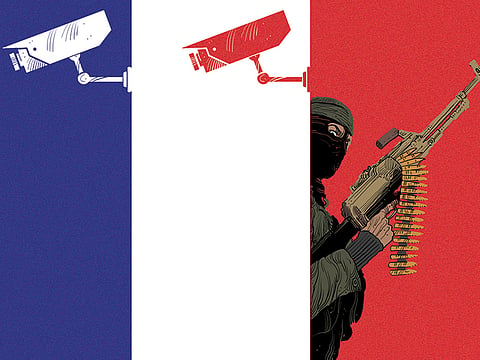Paris attacks ‘an act of war’
The US campaign in Syria has been so half-hearted that business in Daesh’s ‘capital’ Raqqa carried on as usual

For the first time since 1958, Paris is in lockdown, its borders sealed and its population advised to remain in their homes. The coordinated attacks carried out by eight men wearing suicide belts that took the lives of 128 innocent people who were out and about with friends, relaxing at the end of the working week, have rocked the world.
If terrorists can succeed in infiltrating Paris whose security services are acclaimed and were on the highest alert, nowhere is safe, including US cities, which are ramping up security measures. Sadly, Europe’s vulnerability is at an all time high and it’s anticipated that other cities will be targeted.
The French President Francois Hollande has described the heinous crimes as “an act of war”. Pope Francis said “these unjustifiable inhuman acts” have left him in a state of shock and pain. “How can human beings do this,” he asked while asserting the massacre was part of a piecemeal Third World War. For some, that will sound overly dramatic, but is he right?
I believe he is when during the past weeks, Daesh (the self-proclaimed Islamic State of Iraq and the Levant) is suspected of killing more than 100 Turkish citizens in Ankara, downing a Russian passenger plane that crashed on the Sinai Peninsula and slaying members of the Afghan Hazara community in the province of Ghazni. They have claimed responsibility for the twin blasts in a crowded Beirut shopping street as well as the slaughter of civilians in Paris.
Iraq has been at war with Daesh since its bloodthirsty brigades of decapitators and enslavers, comprised of former officers in Saddam Hussain’s disbanded army joined by Islamists, took control of the Iraqi cities of Fallujah and Ramadi during January, 2014.
At that time, those ragtag fighters were seen more as an easily combated irritant than anything more dangerous. That was a severe underestimation. Daesh now controls almost one third of Iraq and roughly 50 per cent of Syria, plus they and their affiliates have a presence in Egypt’s northern Sinai, Libya, Turkey, Yemen and, most recently, Afghanistan. Its leadership has also threatened to “break down Jordan’s borders”.
Until Paris was targeted, the West failed to take this threat with the seriousness it deserved. Are we to imagine that their combined armies and airpower couldn’t have rid the region of this accursed slime spreading its filth everywhere while pretending to be devout so as to pollute the minds of impressionable young Muslims?
Instead, for well over a year, the Middle East was left to its own devices and even when the US and its allies got involved with an air campaign, it was so half-hearted that business in Daesh’s ‘capital’ Raqqa carried on as usual. It was only when Russia got involved, when terrorists were reported to be fleeing and refugees felt secure enough to return to Syria, that President Obama altered his strategy from one of containment to all-out destruction.
Now Europe in particular is faced with a real dilemma that might not be easily solvable because the problem is no longer about ‘them over there’ but hiding, waiting to pounce within its own towns and cities.
More than 750,000 migrants have sought sanctuary in Europe this year alone with the Syrian conflict the biggest driver.
The vast majority are genuine asylum seekers. It is only right that they are receiving sanctuary, but who knows how many are Daesh militants there to fulfil an agenda. For instance, a Syrian passport was found close to the body of one of the terrorists who blew themselves up outside the Stade de France, where teams from France and Germany were battling it out on the pitch.
Even more worrying is the fact that more than 20,000 foreigners have travelled to Syria and Iraq to join Daesh, among them between 5,000 and 6,000 nationals of European states. It’s believed that hundreds, if not thousands, with blood on their hands have already returned to their home countries. In the case of France, the movements and communications of many radical extremists are being monitored, but intelligence services don’t have the capacity or the manpower to monitor all of them 24/7. Moreover, the terrorists have become savvy and have found ways to evade scrutiny on social media and they understand full well that their phone calls are likely being recorded.
Europe is battling a shadowy, covert enemy within, one that has technological knowhow and training in explosives. Clearly its cell members have an added advantage in that they prefer death over life. Seven of the eight Paris attackers blew themselves up; the other was shot dead by security forces.
What’s happening now is laying the foundations for a world war although not in the conventional sense. It’s an asymmetrical war that requires asymmetrical responses from governments which may have to sacrifice liberty for security, even though that will fly in the face of the democratic values they hold so dear. The concept of the EU’s free passage for persons and goods between member states may also have to be revised.
Right now, our thoughts are with the loved ones of those who didn’t make it and the survivors struggling for life in emergency rooms. We cannot bring back the good people who’ve gone from us, but the international community must not let their deaths go for nothing. Acceptance that this is a war that must be dealt with as such would be a good start.
Hopefully, Friday the 13th, 2015, will be seen as a wake-up call that will bring together bickering countries scoring points in Syria against an enemy that has proven to be common to all.


